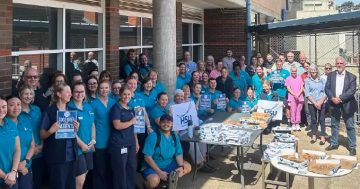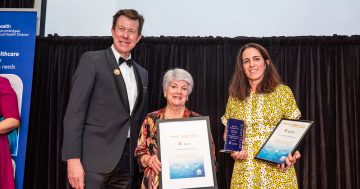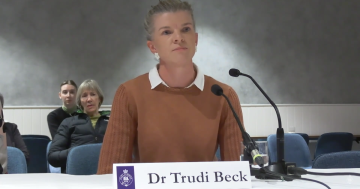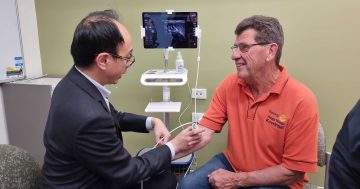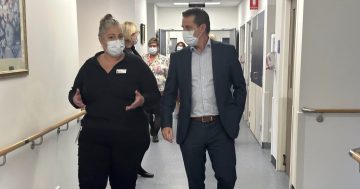
Hamish Patterson Antimicrobial Stewardship Pharmacist at Wagga Wagga Base Hospital. Photo: Murrumbidgee Local Health District.
Hamish Patterson is the man to whom one goes to work out what is the right medication for your bug.
The antimicrobial stewardship pharmacist at Wagga Wagga Base Hospital loves all the microbes and figuring out the right medication.
Hamish is known among his peers as someone who will be able to convince anyone that microbes are fascinating.
“Infections and the different antimicrobials we can use to target these fascinate me,” Hamish said.
“The opportunity to specialise in that as a pharmacist and to be involved in that aspect of a patient’s care is really rewarding.
“We can guide therapy in terms of optimising doses and use dose calculation software to do therapeutic drug monitoring, to make sure we are getting effective use but preventing toxicity and side effects.”
Hamish finished his schooling in Cootamundra and completed his Bachelor of Applied Science in Canberra.
He found his pathway while living with his housemate, a pharmacy student, with both of them spending hours discussing the housemate’s assignments.
“I was hooked,” Hamish said. “I realised I’d always been interested in something as simple as having a headache – you take ibuprofen and it goes away – but if you didn’t you’d still have a headache and your day would be ruined.
“I’d think, ‘How does that work? How does it happen? That’s really cool!’
“By extension, now I’m like that with every drug – how will it work? Why does it work for you and not for someone else?”
In 2017, Hamish came back to the Murrumbidgee after completing his degree and internship in pharmacy.
He took on the role of deputy director of pharmacy with the Murrumbidgee Local Health District and in 2019, he was appointed antimicrobial stewardship pharmacist at Wagga Base Hospital.
Hamish contributes his data to the merging field of antimicrobials and antimicrobial resistance and is learning more every day.
“We present our data at a meeting of our peers where we look at our utilisation of antimicrobials, and if there are any trends and anomalies, we can look into it further – for example, is there an emerging resistant antimicrobial?
“Are we inadvertently creating resistance by using a certain type of treatment? Or are we perhaps jumping to the big guns first without considering some of the other options?”
Hamish speaks highly of MLHD infectious diseases specialist Dr Timothy Gilbey, who he says has “a wealth of knowledge and is generous with his time”.
“If you have a question, and you’re genuinely curious, he will spend the time to teach you and I really appreciate that,” Hamish said.
“If I notice anything in our data that stands out, I liaise with Dr Gilbey and we look into it a bit further. For example, if we’ve used a lot of a specific antimicrobial in a certain period, we can tease it down further in case there’s perhaps some resistant organisms that we need to monitor closely.
“There’s a big focus on the data and ensuring you have reliable data – you have to have the confidence to challenge other members of the treating team, so you need that validated data to back it up.”
Hamish says the main goal of the field is to find out whether the best practice is being followed as the consequences of not doing so will end with more resistant bugs.
“Then we have to use broader-spectrum antimicrobials which may be associated with more side effects and therefore increase the length of a hospital stay for a patient.”
Hamish also has a keen interest in antibiotic allergies.
“About 10 per cent of the population will have a penicillin allergy on their medical record, but up to 90 per cent of those patients may not, in fact, have a true allergy,” he said.
“For example, they may have self-reported it based on symptoms that may be attributable to the illness rather than the medication, or it may have been some time ago, and changes to the way penicillin is manufactured may mean it is no longer current.
“We’re also discovering people don’t necessarily hold on to a penicillin allergy forever.
”If we find you could safely receive penicillin, it then opens up a whole family of antibiotics that we can use to help get you well as quickly and safely as possible.
“Penicillins are used and preferred for a range of infections. So that is something I am really looking forward to investigating further and seeing the benefits for our patients.”







